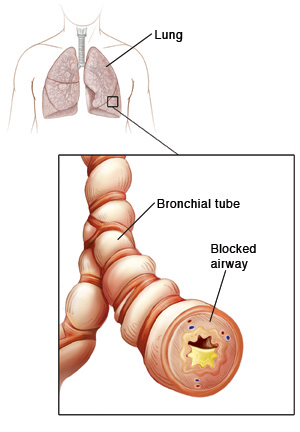Acute Bronchitis
Acute Bronchitis
Your healthcare provider has told you that you have acute bronchitis. Bronchitis is infection or inflammation of the bronchial tubes (airways in the lungs). Normally, air moves easily in and out of the airways. Bronchitis narrows the airways, making it harder for air to flow in and out of the lungs. This causes symptoms such as shortness of breath, coughing up yellow or green mucus, and wheezing. Bronchitis can be acute or chronic. Acute means the condition comes on quickly and goes away in a short time, usually within 3 to 10 days. Chronic means a condition lasts a long time and often comes back.
What causes acute bronchitis?
Acute bronchitis almost always starts as a viral respiratory infection, such as a cold or the flu. Certain factors make it more likely for a cold or flu to turn into bronchitis. These include being very young, being elderly, having a heart or lung problem, or having a weak immune system. Cigarette smoking also makes bronchitis more likely.
When bronchitis develops, the airways become swollen. The airways may also become infected with bacteria. This is known as a secondary infection.
Diagnosing acute bronchitis
Your healthcare provider will examine you and ask about your symptoms and health history. You may also have a sputum culture to test the fluid in your lungs. Chest X-rays may be done to look for infection in the lungs.
Treating acute bronchitis
Bronchitis usually clears up as the cold or flu goes away. You can help feel better faster by doing the following:
Take medicine as directed. You may be told to take ibuprofen or other over-the-counter medicines. These help relieve inflammation in your bronchial tubes. Your healthcare provider may prescribe an inhaler to help open up the bronchial tubes. Most of the time, acute bronchitis is caused by a viral infection. Antibiotics are usually not prescribed for viral infections.
Drink plenty of fluids, such as water, juice, or warm soup. Fluids loosen mucus so that you can cough it up. This helps you breathe more easily. Fluids also prevent dehydration.
Make sure you get plenty of rest.
Do not smoke. Do not allow anyone else to smoke in your home.
Recovery and follow-up
Follow up with your doctor as you are told. You will likely feel better in a week or two. But a dry cough can linger beyond that time. Let your doctor know if you still have symptoms (other than a dry cough) after 2 weeks, or if you’re prone to getting bronchial infections. Take steps to protect yourself from future infections. These steps include stopping smoking and avoiding tobacco smoke, washing your hands often, and getting a yearly flu shot.
When to call your healthcare provider
Call the healthcare provider if you have any of the following:
Fever of 100.4°F (38.0°C) or higher, or as advised
Symptoms that get worse, or new symptoms
Trouble breathing
Symptoms that don’t start to improve within a week, or within 3 days of taking antibiotics
Updated:
December 10, 2017
Sources:
Acute Bronchitis in Adults. UpToDate.
Reviewed By:
Adler, Liora, C., MD,Image reviewed by StayWell medical illustration team.,Sather, Rita, RN
